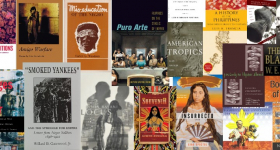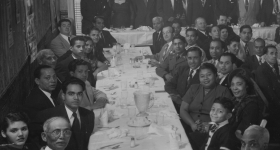This column by Frances Wang reminded me of when I was in grade school. There was a Chinese/Japanese American family whose kids were a year and three years behind me. They were called the Hsiehs. For some reason, no one could manage the closest approximation to correct pronunciation, which would have been "sheh" like "chef" without the "f"; everyone called them the "Shays". This drove me nuts, and I remember correcting children and adults alike, and trying to get them to say "shed without the 'd'." And let's not even get into how they mangled the kids' Chinese and Japanese first names. Argh. (It's worth noting that the Hsieh kids themselves didn't bother correcting people.)
Nowadays I offer admiration to the parents who held fast with hard-to-pronounce names, while admitting to puzzlement that they didn't give their kids Euro nicknames for daily use. It was the seventies, after all, and those were common tactics. My family took the usual Hong Kong route of giving us European names and Chinese names, so we could use whichever was appropriate in whichever space (although none of my Chinese relatives has ever used my Chinese name. They just call me Ah-Clai-ah.) Other tactics I've seen include giving kids an Asian name that is similar to recognizable Euro-American names, or giving the kids a Euro first name and an Asian second name.
Of course, I also lived abroad in China and Germany for extended periods of my life, and my Euro-American name was relentlessly mispronounced in both places (though in China I mostly used my Chinese name) and that didn't bother me at all; in fact, I found it rather charming. Maybe that's because in China and Germany I was a foreigner, and felt myself to be one, so to have local inhabitants misprounce my obviously foreign name wasn't a problem. But at home, having your fellow Americans treat your name as foreign may point to a deeper sense that you and your family are viewed as permanently foreign. Maybe.
What about you? What strategies did your family employ to make it easy for people to call your name? Or did they just expect the world to suck it up and get it right? And if/when people misprounouce your name, what do you do? Do you let it slide? Do you correct them? Does it depend on your relationship with the person? And does it bother you if/when people mispronounce your name? Why or why not?
As always, be polite, don't insult anyone, don't curse. Please try to stick to personal experience and avoid stereotypes. Do tell!









Comments
You can't expect the average person to be able to pronounce foreign names with any facility. Why would you take offense at this? It is natural that foreign words are adapted to the pronunciation of the speaker's language.
Kimchikraut, what IS "foreign" to Americans? Seriously. The majority of white Americans have some non-English, non-English-speaking European ethnicity in them, and ancestors with European names that were hard to pronounce ... for the British. American Indian names were hard to pronounce for white settlers, which is why we have translations like "Sitting Bull" and poor transliterations like "Seattle." But then, isn't it the white settlers who were "foreign"?
The question is really: who is important enough for us to actually try and pronounce their names correctly? Most Americans who read the news can come up with a reasonable approximation of Mao Tse Tung and Aung San Suu Kyi. It's just that most of America thinks Asian Americans are just -- as you so blithely and thoughtlessly put it -- "foreign," and therefore not worth bothering for.
Your article brings up a slew of points. My main question is, why is a chinese name, which is not written natively in european characters, written in a way that no english speaking person whould pronounce correctly?
If I look at Hsieh, I would say HusEE or HuSAY or Hu SEE eh. No matter which way you look at it, it's not spelled at all the way it's pronounced.
Shed without the d? Sheh. How hard was that?
I'm of european decent, 4th generation American, family name is Jacques. I've heard about 20 variations of my name from Americans, including Jock, Jakes, JuquEEZ, Jackess (surprisingly never been called Jackass), Hockess, and of course my own family pronouces it as white as possible- Jackwess. I've finally gone to pronouncing it the real french way.
The main difference being, my name is originally written in the european alphabet, while Asian names are not. Why are they written in a way that causes this problem?
Though after all, even writing it correctly doesn't guarantee it'll be pronouced correctly- To this day I can't figure out how we get Carry-okey out of KaraOke, Europeans need to rhyme?
Your article brings up a slew of points. My main question is, why is a chinese name, which is not written natively in european characters, written in a way that no english speaking person whould pronounce correctly?
Your response brings up a slew of points. Chief among them is the assumption that the romanization of a Chinese name is done for the benefit of "english speaking persons." It is not.
First of all "romanization" is so called because the alphabet we are using, the same one that most European languages use, is the Roman alphabet. It's not the English alphabet. And yes, the Roman alphabet is common to a number of languages that are not based on Latin, including Hungarian and Basque. Each different language that uses the Roman alphabet, uses it differently, that is to say, each language pronounces the same letters somewhat differently. So there is no standard pronunciation of the letters "h," "s," "i," and "e."
Secondly, Chinese has been romanized according to several different systems over the years. Some of these were created by English speakers, one very influential one was created by French speakers, and the current one in use in China was created, quite rightly, by the Chinese themselves.
"Hsieh" comes from a particular romanization, which is falling out of favor now. The pinyin system current in the PRC would spell the same name "Xie." And the approximation that I gave it above is only very approximate. The "Sh" sound isn't really an "sh." It's halfway between "s" and "sh." Also, the "ie" sound isn't exactly an "eh" sound, either. It's two sounds -- "ee" and "eh" -- crammed together. So "Hsieh" could just as easily be approximated spelled "see-eh."
The purpose of Chinese romanization is not to approximate English pronunciation. The purpose of Chinese romanization is to give Chinese people, and any people who want to learn Chinese, a written alphabet. Period. Chinese characters are not an alphabet, and are therefore extremely difficult and time-consuming to learn. So having a Roman alphabet that both Chinese and non-Chinese can learn--so as to communicate in the absence of the 3-6 years it requires to learn enough characters to write fluently--is very useful.
Your difficulty in understanding how to pronounce "Hsieh" comes from ignorance of the language, not any failure in the written language itself. Although you know the letters, you wouldn't know how to pronounce "Oesterreich" or "Wuertzel" in German, or "hablas" or "español" in Spanish, or "čeština" in Czech -- or "Jacques" in French -- unless you were taught to. It's the same with Chinese romanization.
Okay, seems there is no way to directly reply to your reply. Funny how you have it set up that way.
First of all, clearly the roman alphabet is used by many non-latin speaking countries, including England. English is only parly latin based.
if romanization is not trying to allow non-alphabet languages be pronounced in English, then there is really no point in it at all. What good is romanization if it's to be interpreted differently by the myriad of aplhpabet using languages, they'll never pronounce things the same way unless there is a standard. Your whole article is talking about AMERICA, where currently, English is the standard.
Another point is the chinese way of speaking simply can NOT romanized! There are far too many intricacies of Cantonese or Mandarin to be represented by the simple English, Spanish, Hungarian, or whatever alphabet.
Basically the same way the Katakana versions of foreign words don't even come close to the real thing. The Japanese system is even more limited than the Roman.
So you've got your rant about non-Chinese Americans mispronouncing Chinese names, and you're on the verge of calling them racist, AND you post it like you're the poor martyrs of America. Why don't you come up with a solution instead?
This is America, we speak English as the standard so there is no miscommunication.
You'd prefer diversity where no one can understand each other and nothing gets accomplished?
if romanization is not trying to allow non-alphabet languages be pronounced in English, then there is really no point in it at all.
Did you really mean to say "English"? Because there are a LOT of non-English speakers in the world who might want to learn Chinese. Is there really NO POINT in romanizing a language if ENGLISH SPEAKERS can't use it? Wow.
What good is romanization if it's to be interpreted differently by the myriad of aplhpabet using languages, they'll never pronounce things the same way unless there is a standard.
I just told you what good romanization is. It's an alphabet; easier to learn than Chinese characters, for both Chinese and everybody else, not just English speakers. EVERYONE USES ROMANIZATION DIFFERENTLY. THERE IS NO STANDARD AND NEVER HAS BEEN (since Roman times, anyway.) And yet, somehow, we all get along with learning other languages ... those of us who bother to learn other languages, that is. Everyone who bothers to learn some Chinese WILL be able to pronounce it the same way. Likewise, everyone who bothers to learn how to pronounce their neighbor's Chinese name will be able to pronounce it the same way.
Your whole article is talking about AMERICA, where currently, English is the standard.
Yes, I'm talking about the ignorance of Americans who refuse to learn even small things about other languages so that they can pronounce their neighbors' names. As you yourself well know, although English is the official language in this country, English names are not the standard, and mispronunciation of names is very common. There's no such thing as a "foreign" name in an immigrant country. No. Such. Thing.
Okay, I'm done with this argument. I will not repeat it (again), nor let you repeat yours. Come up with something new or move on.
Claire,
Ask any person with the name "Nguyen" and you'll tap into a deep crevasse of hilarious and sometimes painful anecdotes regarding mangled pronunciation. Vietnamese is a crazy (written) language because it was Romanized by a French monk, who used all sorts of Roman letters and accents to create the Vietnamese written language. Then Vietnamese people moved to America and added another layer of complexity. The end result is that we have an Asian language, translated into French (or something) pronounced by people who speak English. It's like trying to read Hieroglyphics by having a German describe it to you via a telegraph.
I would say it's almost impossible for a non-native speaker to say Nguyen correctly. It's like in that Simpsons episode where the alien tells Marge that in order to pronounce his name correctly, he'd have to rip out her tongue. The accent marks alone are devastating and might implode a person's head if not properly trained.
I always found it funny that, as Vietnamese people have grown in number, geography, and clout, that the pronunciation of the surname Nguyen has steadily "improved". When I was a kid, people would say something like "knee-GUY-yen" or "knee-JOO-yen" or "NEW-guy-yen". But now, I can go to any relatively metropolitan place and reasonably expect someone to say it somewhat close to the proper pronunciation. Usually I accept "new-win", "wen" or "new-yen". As long as you don't pronounce the "g", that's all I can really expect. It's a fun sociological phenomenon to see how this very ubiquitous (for Vietnamese people) name is getting "absorbed" into the American mainstream.
Hey look now we're on Family Guy!
http://www.youtube.com/watch?v=r3-xrBN5p14
Asian first and last names are no weirder or harder to pronounce than the tons of European first and last names that are now considered part of American culture and American heritage. In fact some or many Asian names are easier to pronounce, with single or double syllable words. Without thinking I could probably name a dozen extremely "odd" and not phonetic friendly first and last non-Asian immigrant names that are accepted nowadays, simply because through time those immigrant groups have become accepted and respected in the American melting pot. If Asian names are still hard to pronounce or still considered foreign, I think it is only because Asian Americans have lagged behind other immigrant groups in terms of being accepted as American. No matter how much Asians try to assimilate (and I think they try the most, too much so), Americans still don't see or accept Asian Americans as truly American. In WWII only Japanese Americans were put into internment camps, not their Euro counterparts. Even now you have lawmakers in Texas saying Asian immigrants should use Anglo names, and not point out other immigrant groups for the hard to pronounce names. Asian Americans should realize that being accepted as American will happen when they celebrate and protect/preserve their cultures and heritage, rather than assimilate at all costs, including try to name all their kids Anglo names. In a counter-intuitive way, it may be that protecting/preserving your roots in America may earn more eventual acceptance into the melting pot, than assimilating to the point of rejecting/ignoring one's history.
Hey Alvin, just a correction: some German and Italian Americans were interned during WWII.
About 11,000 German Americans were interned; there were far more German Americans than JAs, though, and though the government considered clearing them all away from the coasts, they didn't attempt it. You can read more here: http://www.gaic.info/
Apparently the numbers of Italian Americans interned was fairly negligible, given the literally millions of foreign-born naturalized Italian Americans in the US at the time, which they couldn't intern. (They did make about 600K of them carry registration cards, though.)
It's true that the treatment was different, and a lot of this had to do with racism. But it's a bit more complicated than that.